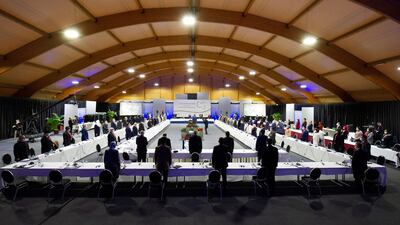Libyan delegates at UN-backed talks on Tuesday held the first round of voting for a three-member presidency council, part of a new transitional executive to govern the country until December elections.
It is part of a complex process hoped to guide the deeply divided country towards peace and build on a fragile ceasefire to end more than a decade of devastating conflict.
Oil-rich Libya has been torn by civil war since a Nato-backed uprising led to the removal and killing of long-time dictator Muammar Qaddafi in 2011.
The country has become a key corridor for migrants fleeing war and poverty in desperate bids to reach Europe.
The 75 participants at the Libyan Political Dialogue Forum near Geneva, who were chosen by the UN to represent a broad cross section of society, were shown on UN footage casting their ballots in three boxes, each representing a region.
But with none of the 24 candidates meeting the required threshold of 70 per cent of votes, elections moved to a second round.
The three council posts, a president and two vice presidents, will represent Tripolitania in the west, Cyrenaica in the east and Fezzan in the south.
The 24 candidates for the three posts gave campaign speeches on Monday by video, with many calling for reconciliation and the withdrawal of the estimated 20,000 foreign troops and mercenaries in Libya.
The UN said the future transitional council would have the job of "reuniting state institutions and ensuring security" until elections that are set for December.
Control of the country is now split between the Government of National Accord in Tripoli and its rival, the House of Representatives in the eastern city of Tobruk.
The Tobruk administration is backed by Field Marshal Khalifa Haftar's Libyan National Army, which launched an offensive to seize the capital in 2019.
A fragile ceasefire agreed on in Geneva in October has largely held.
The Speaker of the Tobruk Parliament, Aguila Saleh, took nine votes on Tuesday to become the leading eastern candidate.
The top western candidate was Khaled El Mechri, who leads the High State Council aligned with the GNA, with eight votes.
From the south, Abdel Majid El Nasser, Libya's ambassador to Morocco who is descended from a long line of influential tribal leaders in Fezzan, took six votes.
But with none of the top three meeting the threshold, the next round of voting will be based on a list-based system, the UN announced.
"It is going to be complicated," Claudia Gazzini, from the International Crisis Group think tank, said on Twitter.
"Much can still go wrong. But it is uplifting to see candidates delivering political speeches, rather than making hate-filled declarations of war."
Delegates have until Friday to choose from 21 candidates vying for the post of prime minister.
GNA Interior Minister Fathi Bashagha, a heavyweight in local politics, is a favourite for the job.
The political talks began in mid-November in Tunisia, where the 75 delegates were given the job of laying out a roadmap towards elections.
In mid-November, they agreed to organise "national" elections on December 24, 2021.

